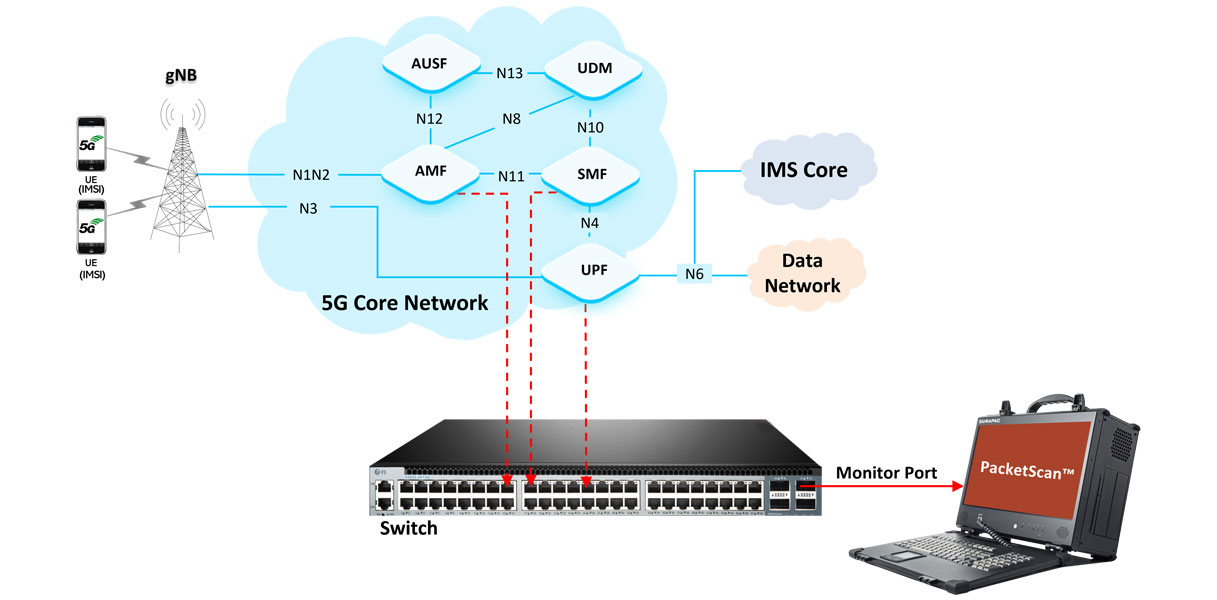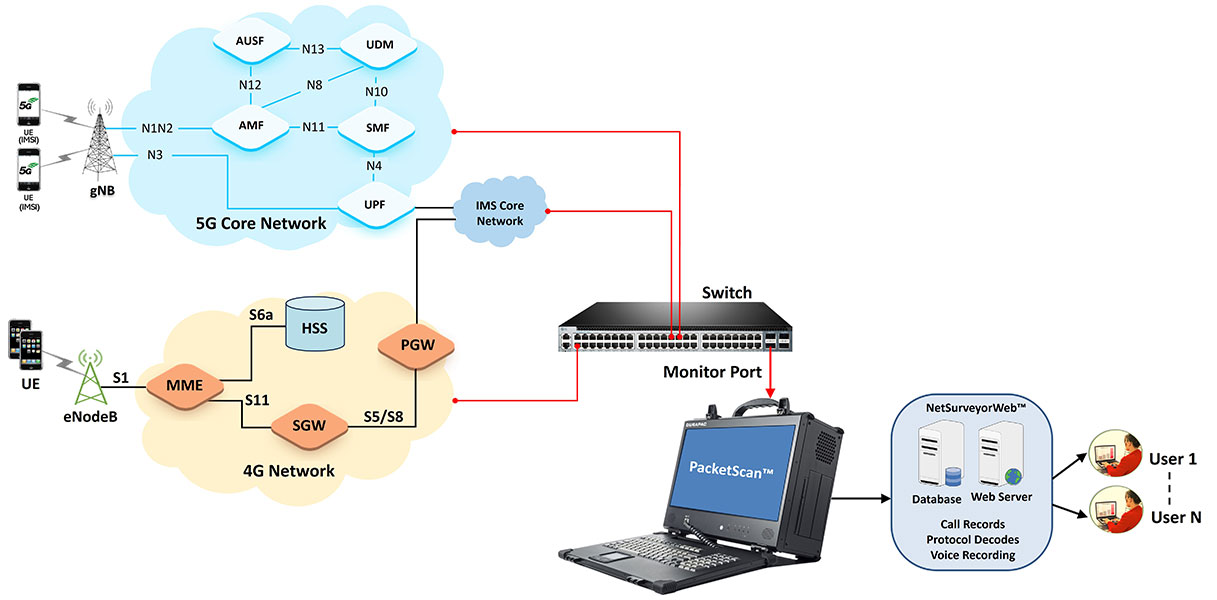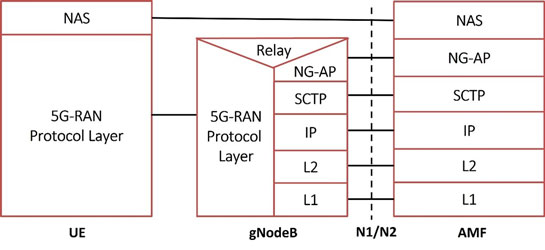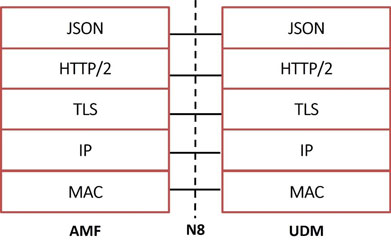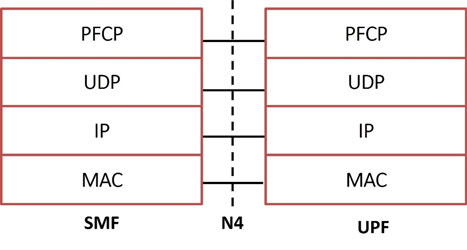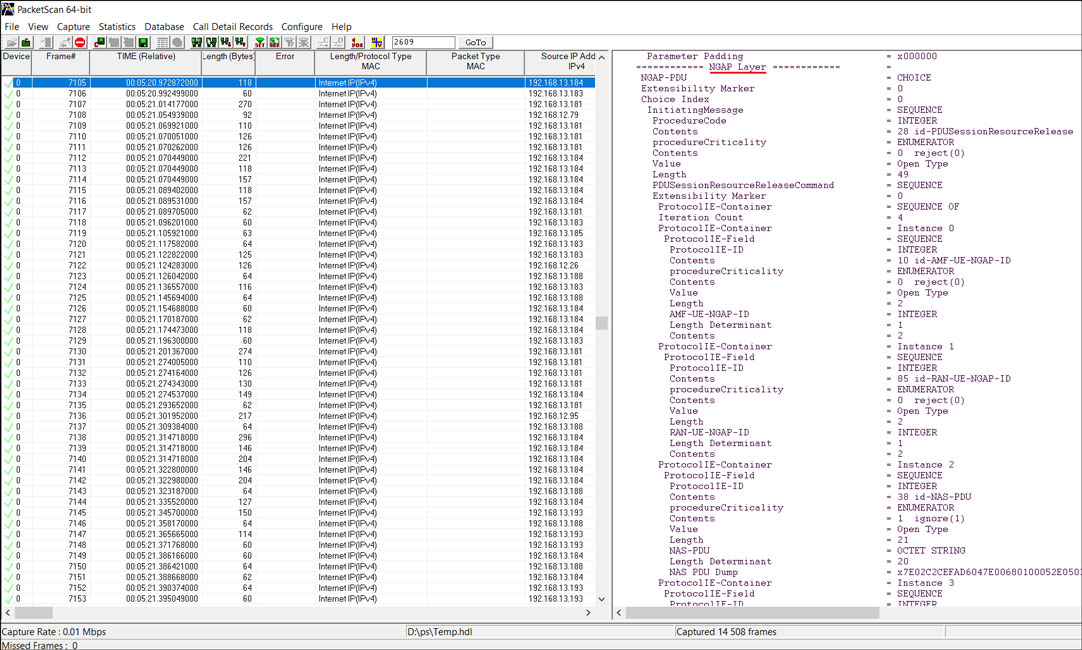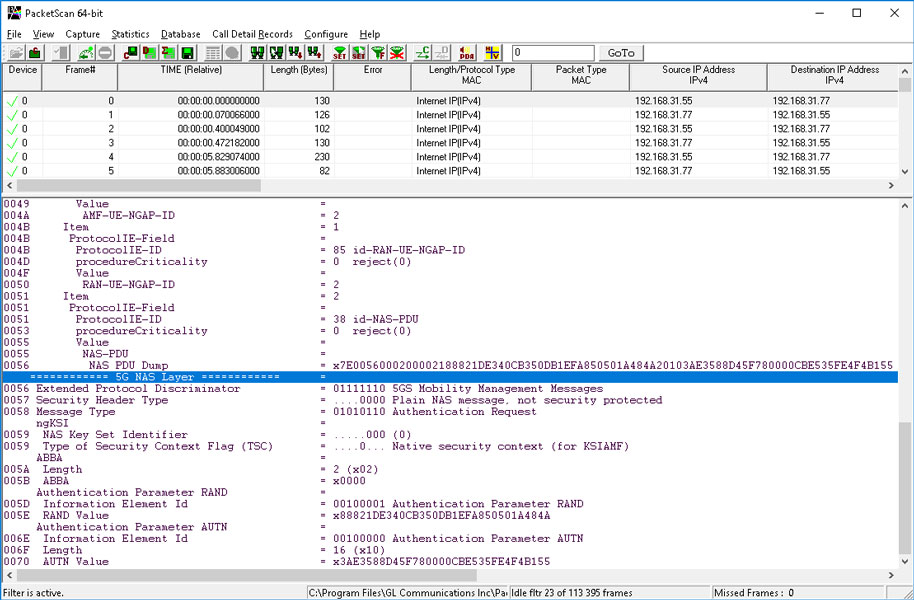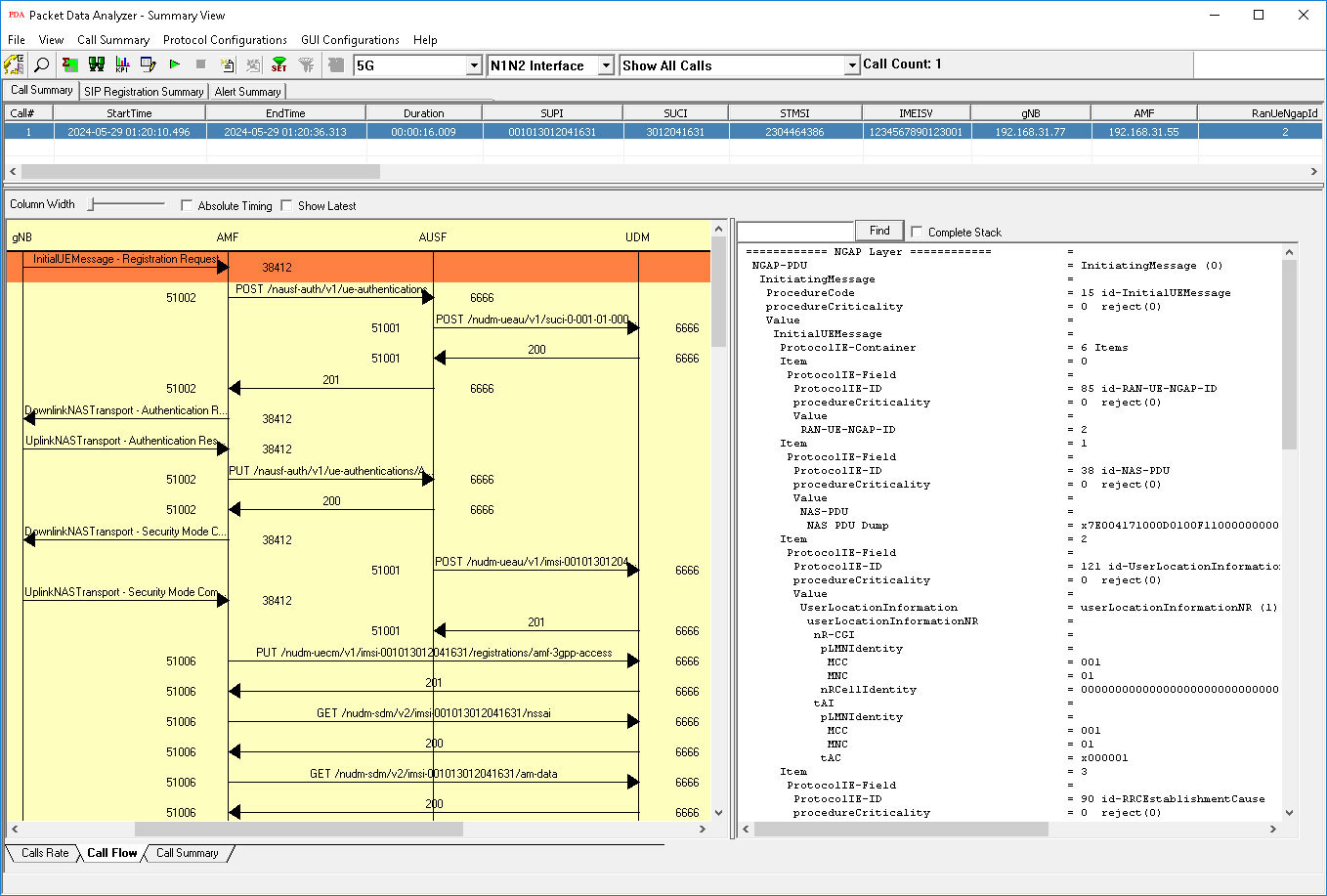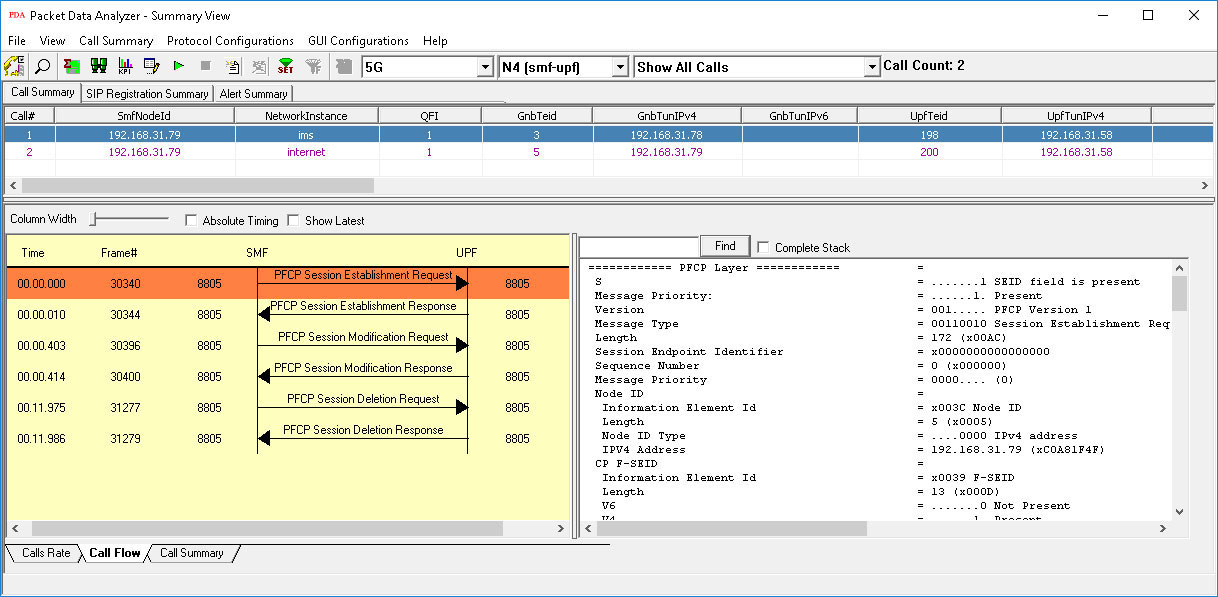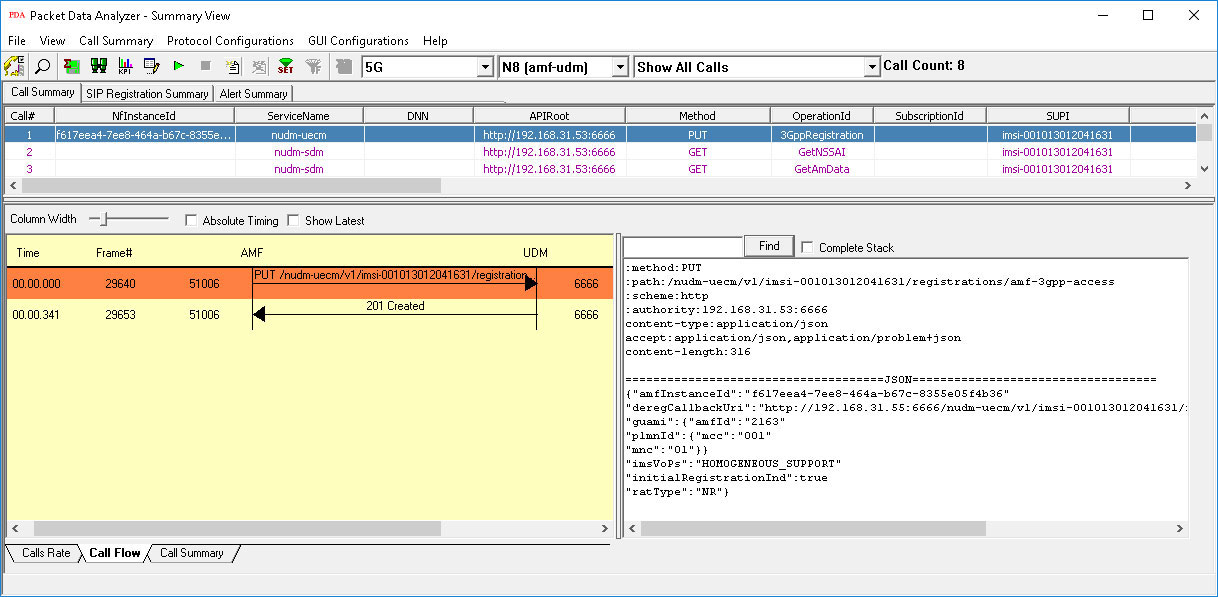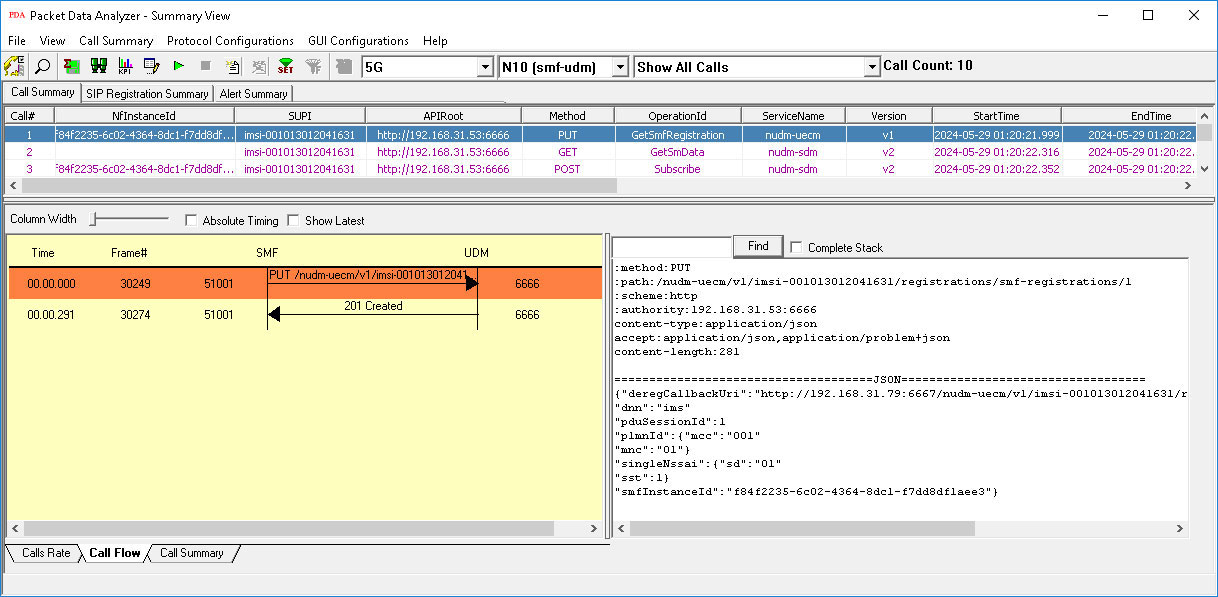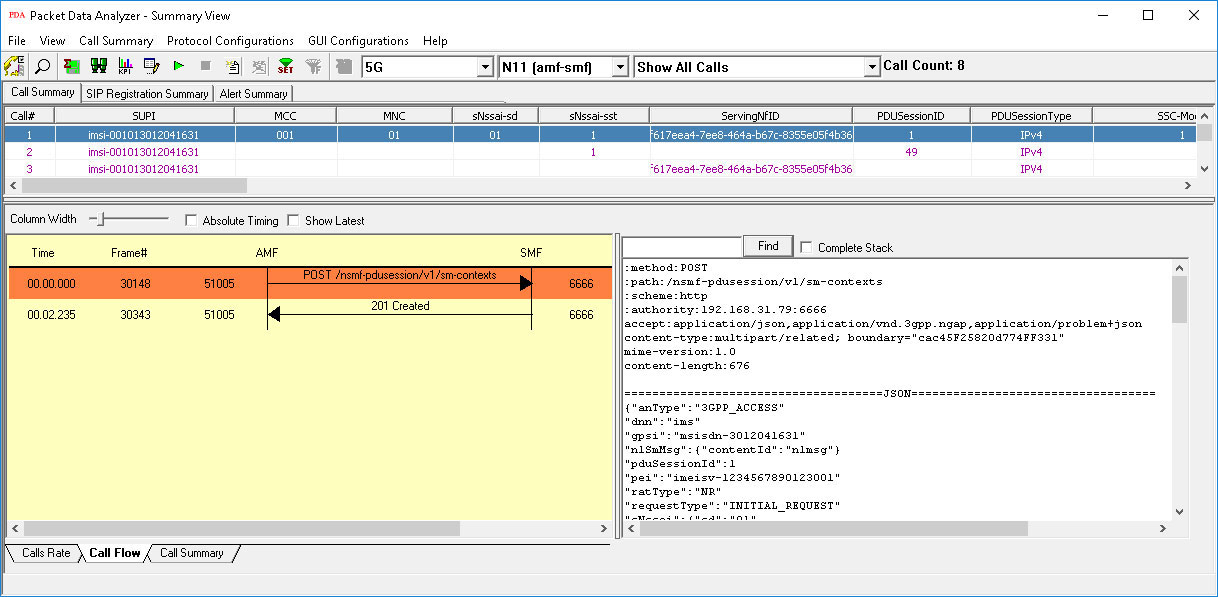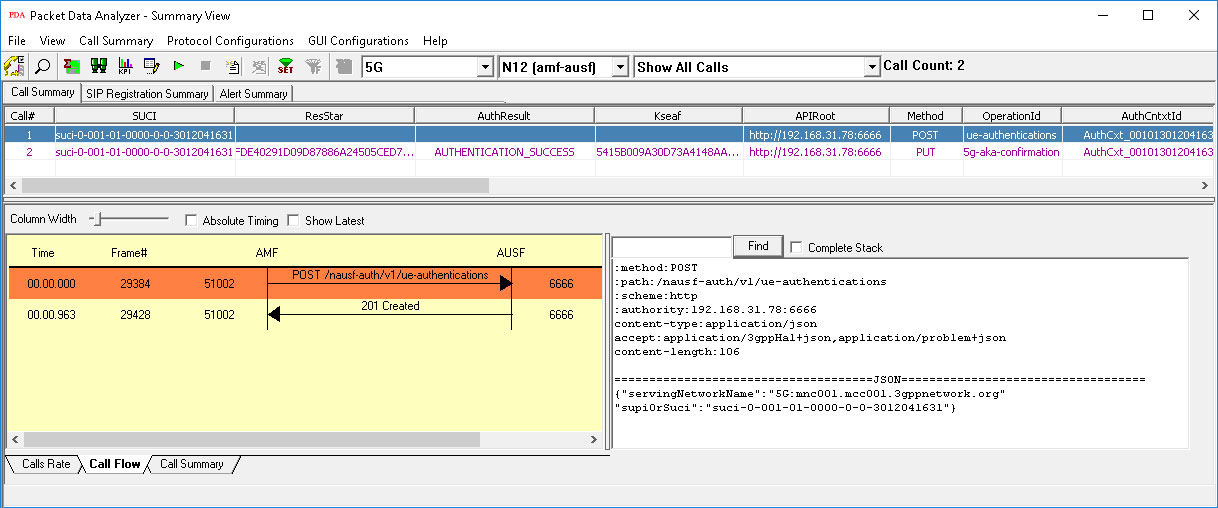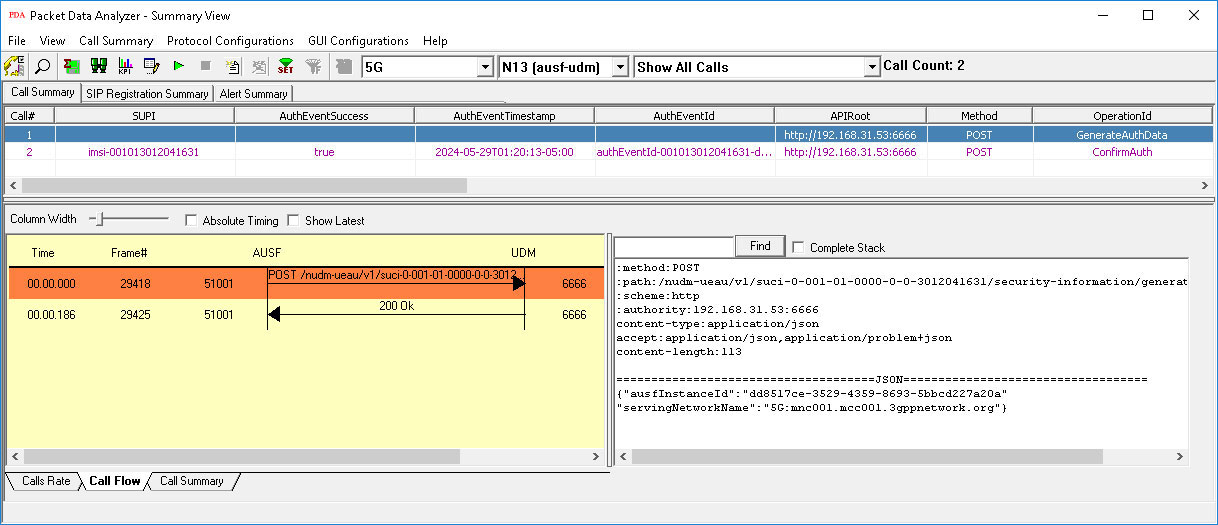5G Protocol Analyzer for Comprehensive 5G Network Monitoring
GL's 5G Protocol Analyzer is capable of capturing, decoding, and performing various test measurements across various interfaces such as N1N2, N4, N8, N10, N11, N12, N13 interfaces of the 5G network.
Request a Demo / Quote BrochureOverview
GL's 5G Protocol Analyzer is a specialized tool designed for comprehensive network analysis in 5G environments. It captures, decodes, and performs test measurements across critical 5G interfaces including N1N2, N4, N8, N10, N11, N12, and N13, enabling operators to monitor and optimize next-generation networks.
Supports 5G's three core verticals:
- Enhanced Mobile Broadband (eMBB) for high-speed connectivity
- Massive Machine Type Communications (mMTC) for IoT scalability
- Ultra-Reliable Low Latency Communications (URLLC) for mission-critical applications
Integrated into GL’s PacketScan™ platform, the analyzer is available as the PKV112 module through additional licensing. This modular approach allows seamless integration into existing network monitoring workflows. Monitors and segregates traffic across interfaces, providing real-time statistics and call analytics for network troubleshooting. Compatible with diverse 5G use cases such as smart cities, autonomous vehicles, AR/VR, and industrial IoT.
Main Features
- Capture, decode, and analyze calls in the 5G Network
- Supported protocols include - Non-Access Stratum (NAS), Next Generation Application Protocol (NGAP), Packet Forwarding Control Protocol (PFCP), XnAP, SCTP, UDP, TCP, and IP
- Decode Enhanced Common Public Radio Interface (eCPRI) protocol
- Following interfaces are supported in Packet Data Analyzer:
- N1 N2 Interface - gNodeB (also called Next Generation RAN), and AMF (Access and Mobility Management Function) nodes
- N4 Interface - Session Management Function (SMF) and User Plane Function (UPF) elements
- N8 Interface - Unified Data Management (UDM) and Access and Mobility Management Function (AMF)
- N10 Interface - Unified Data Management (UDM) and Session Management Function (SMF)
- N11 Interface - Mobility Management Function (AMF) and Session Management Function (SMF)
- N12 Interface - Authentication Server Function (AUSF) and Access and Mobility Management Function (AMF)
- N13 Interface - Authentication Server Function (AUSF) and User Data Management (UDM)
- Save calls to PCAP (Wireshark® format) and in HDL (GL Proprietary format)
- PDA in Packetscan™ provides a complete call flow of a 5G session
- Advanced filtering and search based on any user selected protocol fields
- Add any protocol field to the summary view, filtering, and search features. This flexibility allows users to monitor the specific protocol fields they need
- Trigger intelligent actions based on signaling and traffic conditions
- Displays Summary, Detail, Hex dump, Statistics, and Call Detail Views
- Hex dump View displays the frame information in HEX and ASCII format, the contents of this view can also be copied to clipboard
- Statistics View displays statistics based on frame count, byte count, frames/sec, bytes/sec etc. for the entire capture data
- Call Detail View displays called/ calling number, released calls, call status, and more
Frequently Asked Questions
- What is GL’s 5G Protocol Analyzer?
- GL’s 5G Protocol Analyzer is a network analysis tool that captures, decodes, and measures traffic across key 5G interfaces, enabling real-time and offline monitoring of 5G networks.
- Which 5G interfaces does the analyzer support?
- It supports N1N2, N4, N8, N10, N11, N12, and N13 interfaces for comprehensive 5G network analysis.
- What protocols can the analyzer decode?
- The analyzer supports decoding of NGAP, NAS, PFCP, and VoNR, among other 5G protocols.
- What types of 5G use cases does it support?
- It is suitable for enhanced mobile broadband (eMBB), massive machine-type communications (mMTC), and ultra-reliable low latency communications (URLLC), covering use cases like IoT, smart cities, AR/VR, and autonomous vehicles.
- Is the 5G Protocol Analyzer a standalone product?
- No, it is an optional module (PKV112) available within GL’s PacketScan™ platform and requires additional licensing.
- Can the analyzer provide real-time statistics and call analytics?
- Yes, it captures, segregates, and monitors all calls, providing detailed statistics and analytics for network troubleshooting and optimization.
- How do I purchase or get a demo of the 5G Protocol Analyzer?
- You can request a demo or purchase the analyzer by contacting our sales team at info@gl.com or fillout the Info Request Form.
- What industries benefit most from using GL’s 5G Protocol Analyzer?
- Telecommunications, IoT, automotive, smart city infrastructure, and AR/VR sectors leverage the analyzer for network validation and troubleshooting.
- Does the analyzer support both NSA and SA 5G architectures?
- Yes, it supports monitoring and analysis for both Non-Standalone (NSA) and Standalone (SA) 5G network deployments.
- Can the analyzer handle encrypted 5G traffic?
- While the analyzer decodes standard protocols, encrypted traffic analysis depends on network configuration and decryption capabilities.
- Is the 5G Protocol Analyzer compatible with other GL test and measurement tools?
- Yes, it integrates seamlessly within GL’s PacketScan™ suite and can complement other GL hardware and software solutions.
- What formats are supported for captured data export?
- Captured data can be exported in standard formats such as PCAP for further offline analysis.
- How does the analyzer help improve 5G network performance?
- By providing detailed protocol-level insights and call statistics, it helps identify bottlenecks, protocol errors, and performance issues for optimization.
- What kind of licensing model does GL offer for this analyzer?
- The 5G Protocol Analyzer is offered as an optional licensed module (PKV112) within PacketScan™, with flexible licensing based on user requirements.
- Is training or technical support available for users of the 5G Protocol Analyzer?
- GL Communications provides training, documentation, and technical support to ensure effective use of the analyzer.
| 3GPP (Release 17) standards | |
|---|---|
| Supported Protocols | Standard / Specification |
| System Architecture for the 5G | TS 23.501 |
| NG Application Protocol (NGAP) | TS 38.413 |
| Non-Access-Stratum (NAS) | TS 24.501 |
| GPRS Tunneling Protocol for User Plane (GTP-U) | TS 29.281 |
| NR and NG-RAN Overall Description | TS 28.300 |
| Packet Forwarding Control Protocol (PFCP) | TS 29.244 |
| IETF RFCs for Security, Transport, and Common Protocols | |
|---|---|
| Supported Protocols | Standard / Specification |
| UDP | RFC 768 |
| IPv4 | RFC 791 [5] |
| IPv6 | RFC 2460 [6] |
| JavaScript Object Notation (JSON) | RFC 8259 |
| HTTP/2 | RFC 7231 RFC 7540/RFC 7541 |
| TLS | RFC 8446 |
| TCP | RFC 793 |
Monitoring 5G Networks
GL's PacketScan™ protocol analyzer provides options to analyze set of Network Functions (NFs) and service based interfaces over 5G to monitor live signaling and traffic on the following interfaces.
- N1N2 - gNodeB (gNB), and Access and Mobility Management Function (AMF)
- N4 - Session Management Function (SMF) and User Plane Function (UPF)
- N8 - Unified Data Management (UDM) and Access and Mobility Management Function (AMF)
- N10 - Unified Data Management (UDM) and Session Management Function (SMF)
- N11 - Mobility Management Function (AMF) and Session Management Function (SMF)
- N12 - Authentication Server Function (AUSF) and Access and Mobility Management Function (AMF)
- N13 - Authentication Server Function (AUSF) and User Data Management (UDM)
Key Features
- NGAP and NAS protocol monitoring
- Supports monitoring of VoNR (Voice) calls
- Provides VoNR call statistics such as caller, callee, MOS scores, discarded packets and voice storage
- Provides a complete call flow of a 5G session
- Supports both real-time and offline analysis
- Services use REST APIs based on HTTP and JSON data format
- QoS requests for greater or lesser bandwidth
- Supports services as Voice Quality, Data Retention, Lawful Interception, Fraud Detection
The below screenshots illustrates 5G call (NGAP Layer and NAS Layer) decoded in Packetscan™ analyzer.
5G Call Analysis (Call Graph) in Packet Data Analyzer (PDA)
Resources
Note: PCs which include GL hardware/software require Intel or AMD processors for compliance.
| Item | Description |
| PKV112 | 5G Analyzer (Optional with PacketScan™) |
| PKV113 | Offline 5G Analyzer (Optional with PacketScan™ and NetSurveyorWeb™) |
| Item | Description |
| PKV100 | PacketScan™ - (Online and Offline) |
| PKV101 | PacketScan™ - Offline |
| PKV110 | IMS Protocol Decodes (Optional with PacketScan™) |
| PKV107 | LTE (Long Term Evolution) Analyzer (Optional with PacketScan™) |
| PKV108 | Offline LTE (Long Term Evolution) Analyzer (Optional with PacketScan™) |
| PKV105 | SIGTRAN (Optional with PacketScan™) |
| PKV106 | Offline SIGTRAN Analyzer (Optional with PacketScan™) |
| PKV103 | IP Based GSM and UMTS Analyzer (Optional with PacketScan™) |
| PKV109 | Offline IP Based GSM and UMTS Analyzer (Optional with PacketScan™) |
| PKV104 | FaxScan™ for SIP and Fax over IP (T.38) |
| Related Hardware for IP | |
| PKV120 | PacketScan™ HD w/4 x 1GigE |
| PKV120p | PacketScan™ HD w/4 x 1GigE - Portable |
| PKV122 | PacketScan™ HD w/2 x 10GigE |
| PKV121 | PacketScan™ FB - (Offline Analyzer) |
| PKV122p | PacketScan™ HD w/2 x 10 GigE - Portable |
| PKV123 | PacketRecorder™ HD & PacketRePlay™ HD |
| PKV124 | PacketScan™ HD w/40/100 GigE |
| PKV124P | PacketScan™ HD w/40/100 GigE - Portable |
| Web Based Monitoring Applications | |
| PKV170 | NetsurveyorWeb™ (Perpetual License, Unlimited Users/Nodes) – Includes Oracle 11g Standard Edition One and Standard Server-Grade Computing Platform |
| PKV169 | NetsurveyorWeb™ Lite - Probe Level WebServer, PacketScan™, and Oracle 11g Express Edition; |
| Brochures |
| PacketScan™ 5G Protocol Analyzer Brochure |
| Presentations |
| PacketScan™ 5G Protocol Analyzer Presentation |
